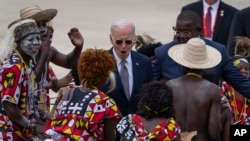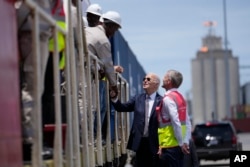U.S. President Joe Biden's visit to Angola highlighted the potential of the Lobito Corridor, a 1,300-kilometer, multinational railway project intended to connect markets and jumpstart trade.
The presidential visit raised hopes but also drew skepticism from some Angolans who spoke to VOA about their daily struggles and the need for economic development.
In Luanda, the capital, Angolans told VOA why they are anxious for the benefits they think will come from the investment.
"We are suffering a lot. We're struggling," said Albertina Manuel, a street vendor, who expressed frustration over rising living costs. "School is very expensive; we are not able to pay our children's tuition. It's harder now. We never suffered like this before," she told VOA's Portuguese Service.
Sacamauro Eduardo, a university student, hoped for a meaningful U.S.-Africa relationship.
"I hope to see a strengthened relationship with Africa, and in particular between Angola and the U.S.," he said. "I hope they approach the most important issues for the people, like poverty and investment in education. We don't want them to just talk. They need to bring good benefits to the Angolan people."
Others, like Amelia Joao, another market seller, said they hope the investment can bring down the cost of staple food products.
"Lower our prices," and "help us produce things," she said. "With more production in the country, the prices will lower."
Solia Selende, another Luanda resident, said the United States should look beyond the polished image often presented to foreign leaders. "If they go deeper into the slums, what they will see will make them very sad," he said. "There are people starving to death, not only in Luanda but in all Angolan provinces."
The Lobito Corridor
The Lobito Corridor project is at the center of Angola's aspirations for economic renewal.
Stretching from the Atlantic port of Lobito through the country's central highlands and into the mineral-rich Democratic Republic of Congo, it could reshape regional trade dynamics, facilitating export of copper, cobalt, and other critical minerals from the DRC and Zambia to global markets.
Initially established during Angola's colonial era, the rail infrastructure suffered years of neglect because of decades of civil war. However, with a $5 billion investment backed by partners including U.S. and European companies, the Lobito Corridor is being refurbished.
Anthony Carroll, senior study group member on critical minerals at the United States Institute of Peace, pointed to its geopolitical and economic significance.
"The Lobito Corridor is a bold effort to refurbish and construct a rail line," he said.
"It will speed access to critical minerals for European and U.S. markets, which have been largely dominated by China in the last 20 years," he said. "It will also give more value to Africans in terms of the return they'll enjoy for enhanced infrastructure investment and development."
Carroll also cited potential problems, including fluctuating global demand for critical minerals and competition from other infrastructure projects, such as the Chinese-funded refurbishment of the Tanzania-Zambia Railway, known as TAZARA, which would carry those minerals to the Indian Ocean for shipping to Asia.
Angola's leadership, however, said the projects can complement each other and there should not be a rivalry. Foreign Minister Tete Antonio emphasized the potential of linking the Lobito Corridor to TAZARA.
"Our ambition is to connect the Indian Ocean to the Atlantic," he told VOA. "This is not about competition; in Africa, we see this as an opportunity for collaboration."
Beyond minerals, the corridor could improve sectors such as agriculture, logistics, and manufacturing. Antonio mentioned discussions on expanding agricultural production for export through the railway route.
Economic integration
The corridor is a centerpiece of the Biden administration's focus on infrastructure development in Africa under the Partnership for Global Infrastructure and Investment, a G7 initiative to counter China's Belt and Road Initiative.
Frances Brown, White House director for African affairs, told VOA's English to Africa Service the U.S. is committed to ensuring the project benefits the region.
"The Lobito Corridor is about investment, it's about infrastructure, but it's also about ensuring that it benefits communities more broadly," she said.
"It's all about sustainable economic development; it's all about a transparent contracting process. It's about ensuring that it boosts regional trade, that it creates quality jobs and improves lives."
For Angola, the corridor could support exports to the United States through the African Growth and Opportunity Act, which allows duty-free access to the U.S. market for certain goods produced in African countries.
Anderson Jeronimo, director of planning at Angola's Agriculture Ministry, described the corridor as a way to improve Angola's agricultural exports.
"Opportunities like AGOA can help us export more coffee and fruit products to the U.S.," he said. "We need U.S. support to better understand and take full advantage of AGOA."
Hopes and challenges
Despite the potential benefits of projects such as the Lobito Corridor, many Angolans face issues such as rising food prices, unaffordable education, and inadequate health care.
The country's economy has been hit hard by fluctuating oil prices and its government has struggled to repay more than $17 billion in debt to China.
Luanda resident Rosalina Cativa said she sees the corridor as a lifeline for the struggling economy.
"Our country is in really bad shape," she said. "A lot of things have to change, especially regarding food prices and education. We look at our country's health, and it's really, really bad. We need help."
VOA Portuguese Service's Coque Mukuta and Mayra Fernandes contributed to the report from Luanda, Angola. VOA English to Africa's Peter Clottey and Philip Alexiou contributed from Washington.

